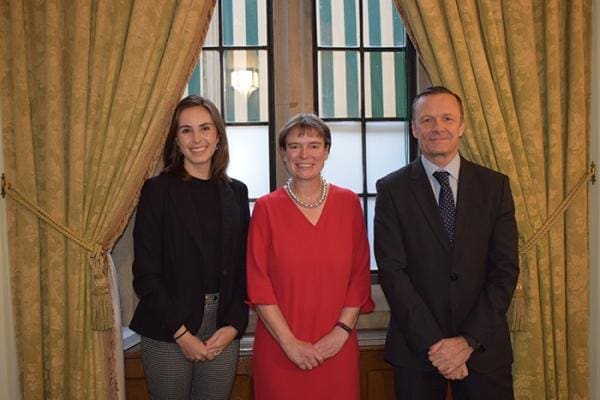
BPF Discusses Decarbonising Plastic at Industry and Government Roundtable Event
The British Plastics Federation (BPF) spoke at an Industry and Parliament Trust (IPT) breakfast event in Westminster on Tuesday 15 November. IPT events are roundtable discussions that focus on a topical area of policy, allowing participants to ask critical questions in a balanced and inclusive way.
Selaine Saxby MP chaired the session, which was called Decarbonising Plastics: Shaping a Circular Economy. Delegates around the table were made up of industry and government representatives, and a variety of perspectives were presented.
The BPF was represented by Sustainability Issues Executive Lara Steinhobel, who explained the trade association’s position, which believes that decarbonising the industry is an important goal that is underpinned by growing the circular economy for plastic products.
Policies such as banning certain single use plastics and the creation of the plastic packaging tax have been implemented to support the development of a circular economy as well as to reduce volumes of plastic waste that could potentially end up in the environment. However, the benefits and challenges of these policies need to be weighed up and addressed appropriately, Steinhobel stated.
During her presentation, she also referenced the 2022 SYSTEMIQ report, ReShaping Plastics: Pathways to a Circular, Climate Neutral Plastics System in Europe. This report identifies the dominant environmental challenges for plastics as high levels of waste generation and greenhouse gas emissions generated during production and disposal.
Steinhobel’s main message to the discussion was that there is no ‘silver bullet’ solution to dealing with plastic waste — and ultimately decarbonisation — but that upstream and downstream solutions are complementary and most effective when deployed together. She stated that the industry is determined to intensify efforts in eliminating plastic pollution while ensuring circularity principles are embedded across the value chain. However, government support is required along this journey.
Continuing the theme of plastic waste management, the discussion around the table delved into some of the challenges the UK faces in growing its capacity for recycling plastic material, expanding reuse models and incorporating more recycled content in plastic products. With key themes in the circular economy debate feeding into the ambitious ‘umbrella’ initiative of achieving net zero, discussions also looked at achieving true circularity and how this ultimately supports the decarbonisation of plastics. The case was made that minimising waste reduces the emissions from products, while mechanically and chemically recycled plastic material can reduce the demand for virgin feedstocks.
Appearing at the IPT event was part of the trade association’s intensifying efforts to brief MPs and peers about key plastics-related topics. The trade association regularly meets with government representatives from a variety of departments and holds an annual parliamentary reception, which is attended by MPs, key government staff and senior industry representatives.
The BPF has published a wide range of resources about the sustainability of plastic and how companies can work towards reducing carbon emissions, many of which are publicly available at: www.bpf.co.uk/resources.
Read more from the BPF here.





